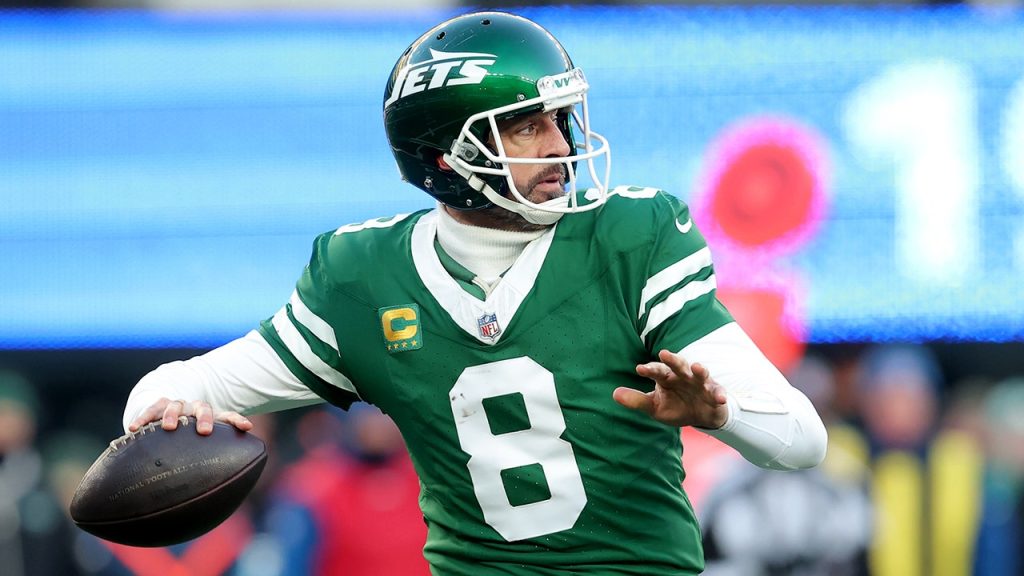Aaron Rodgers’ pursuit of his 500th career touchdown pass has drawn criticism and sparked controversy, particularly following the New York Jets’ 19-9 loss to the Los Angeles Rams. Rodgers’ performance, while statistically decent with 256 passing yards and one touchdown, has been overshadowed by his apparent focus on reaching the milestone. Critics, including former Jets linebacker Bart Scott, argue that Rodgers prioritized personal achievement over team success, particularly referencing a 10-minute drive that ended without points due to Rodgers’ perceived desire to connect with a specific receiver for the historic touchdown. This perceived selfishness, according to Scott, is “despicable,” and underscores a disconnect between Rodgers’ individual goals and the team’s overall performance, which currently stands at a dismal 4-11, effectively eliminating them from playoff contention.
The controversy surrounding Rodgers’ pursuit of the 500th touchdown pass illuminates a broader issue within the Jets organization: the tension between individual ambition and team unity. Rodgers’ post-game comments, where he seemingly challenged his teammates to demonstrate professionalism and commitment during the final two weeks of the season, suggest a fractured locker room and a lack of shared purpose. While Rodgers frames his comments as a call for accountability, critics might interpret them as passing the blame and failing to acknowledge his own role in the team’s struggles. This public airing of grievances further fuels speculation about Rodgers’ future with the Jets and raises questions about his leadership style and its impact on team dynamics.
Rodgers’ emphasis on “perspective” and “truth” in his post-game remarks adds another layer of complexity to the situation. While acknowledging the team’s disappointing record, he stresses the importance of individual players controlling their own perspectives and actions. This focus on individual responsibility, while not inherently negative, could be perceived as deflecting attention from the collective failures of the team. Furthermore, his statement that “everybody’s watching” and that there will be “interesting conversations in the next couple of weeks” hints at potential roster changes and a sense of unease within the organization.
The criticisms leveled against Rodgers underscore the delicate balance between individual accomplishments and team success in professional sports. While individual milestones are celebrated, they should ideally contribute to the team’s overall objectives. In Rodgers’ case, his pursuit of the 500th touchdown, especially in a losing season, has created a perception that he prioritizes personal glory over team victory. This perception is further reinforced by the comments of former Jets players like Scott and Willie Colon, who have publicly questioned Rodgers’ leadership and decision-making.
Furthermore, Rodgers’ post-game comments, while intended to motivate his teammates, reveal a deeper issue within the Jets organization: a lack of unity and shared purpose. His emphasis on individual accountability, while important, may be interpreted as a lack of personal responsibility for the team’s failures. The public nature of his criticisms also risks exacerbating existing tensions within the locker room and creating further division within the team. The final two weeks of the season will be crucial for the Jets, not only in terms of evaluating individual players but also in assessing the overall culture and direction of the organization.
The situation with Rodgers highlights the challenges faced by teams transitioning to a new quarterback, especially one with a strong personality and established legacy. Integrating such a player requires careful management of expectations, both from the player himself and from the team as a whole. In the Jets’ case, the transition has been bumpy, marked by on-field struggles and off-field controversies. The upcoming offseason will be critical for the Jets to reassess their roster, their coaching staff, and their overall strategy moving forward. The questions surrounding Rodgers’ future with the team, and the team’s overall direction, will be central to these discussions.










